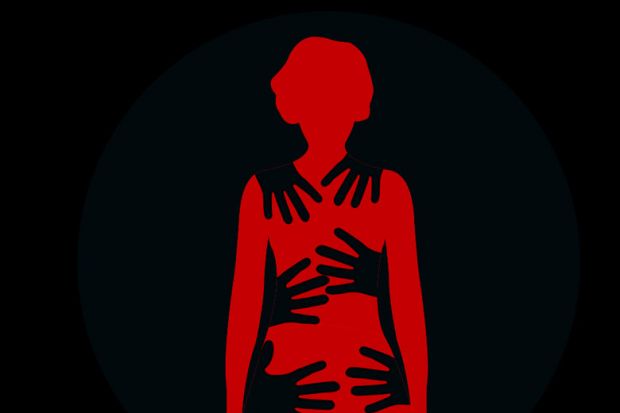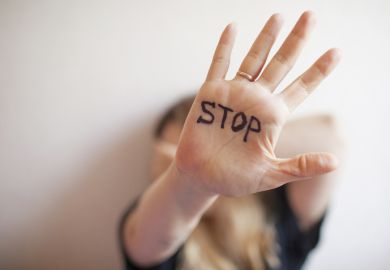Five years ago, I published an anonymous article in Times Higher Education about a romantic relationship I had with an academic.
Elliot (not his real name) began to pursue me when I was his undergraduate student. We ended up dating at the end of my master’s and broke up a few months into my PhD, which he supervised. I consider this relationship an abuse of power, and I want to reflect on what has happened in the five years since I told the world.
The day my story broke was an anxious one. Only a handful of people knew about our relationship, and Elliot had often warned me that if anyone found out, my academic career would be over. I felt powerless to pursue any official complaint against him since we had both left the university. Besides, I dreaded the thought of a drawn-out and potentially public process. The purpose of writing the story, then, was to anonymously contribute to the discussions around sexual misconduct in academia.
What I did not anticipate was that friends, colleagues and even people I had never met (but who knew Elliot) recognised us in the story. The messages of support with which I was inundated were liberating and empowering: I no longer felt ashamed, and I’ve been told many times that I protected women by publishing my story.
So much has happened since then. I’ve had the chance, for instance, to advocate for the creation of a sexual misconduct policy at my current university and to help write it. I also sit on the university’s safeguarding oversight group.
I use my story in my teaching, too. For example, in a course on women in philosophy, students learn about Hypatia’s view on why you must have a strictly intellectual relationship with students. My students debate whether universities should ban sexual relationships. I show them the policy I helped to write and my THE article, and I don’t shy away from questions. Considering how afraid I used to be of other people’s judgement, the freedom to speak up has been life-changing.
Much more significant, however, is how much the landscape has changed around me. In 2018, staff-student relationships were still very much normalised and a mere handful of UK universities had policies on them. Since then, serious research by the 1752 Group has resulted in reports, academic articles and guidance emphasising the need for tighter regulation and better processes for survivors. The group offers consultancy services for universities that need help with misconduct policies and processes. Having taken part in one of its training days, I can attest to the electric enthusiasm for positive change.
Another huge shift has come in how misconduct cases are regarded. In late 2021, Al Jazeera released a podcast series called Degrees of Abuse, which highlighted that abusers in academia often have a pattern of behaviour and leave a trail of victims. The journalists were able to publicly name several academics thanks to the brave women who told their stories. The impact was significant, prompting people to share their own experiences on social media. It led to the formation of advocacy groups such as Silence Will Not Protect Us, a student collective at the University of Oxford. A similar group at Harvard University has staged mass walkouts and demanded better protection for students from academics who abuse their power.
When the podcast was launched, my phone notifications exploded with suggestions that I apply to be on it. I discussed it with some of Elliot’s other victims through our “whisper network”, but we decided against it. Although podcasts are powerful, none of us were sure we were up for a public discussion of our experiences.
Thankfully, another of Elliot’s victims, whom I had never met, also heard the podcast and decided to raise a formal complaint at Elliot’s current institution. In support of it, I wrote a victim impact statement and spoke to the investigating officer about my experiences.
This felt like the first time someone had really taken in how it had affected me. However, the investigation has now ended and Elliot is still at the same institution. I do not know any details because of privacy laws, but this outcome is not entirely unexpected. A report by the 1752 Group that drew on the experiences of sexual misconduct victims across 14 higher education institutions found that out of 16 members of staff who had a complaint submitted against them, only one lost his job. Two resigned during investigations, and 12 are still in the same posts.
This underlines that there is still too little regulation around sexual misconduct in UK universities. Nevertheless, that a complaint against Elliot was submitted at all seems significant. I am much more emboldened to speak up about my own case knowing that there are women who will always back me up with their own truth about Elliot. And there are an increasing number of bans on staff-student relationships at UK universities, including at Exeter, UCL, Nottingham and, most recently, Oxford.
Moreover, almost all universities now “strongly discourage” such relationships. And, in February, the Office for Students began consulting on an England-wide ban on relationships when the academic interacts professionally with the student – or, alternatively, a compulsory register of staff-student relationships.
These are strong signs that the culture is changing. Eventually, academics like Elliot will no longer be able to abuse their power.
For legal reasons, the author has chosen to remain anonymous.
Register to continue
Why register?
- Registration is free and only takes a moment
- Once registered, you can read 3 articles a month
- Sign up for our newsletter
Subscribe
Or subscribe for unlimited access to:
- Unlimited access to news, views, insights & reviews
- Digital editions
- Digital access to THE’s university and college rankings analysis
Already registered or a current subscriber? Login








